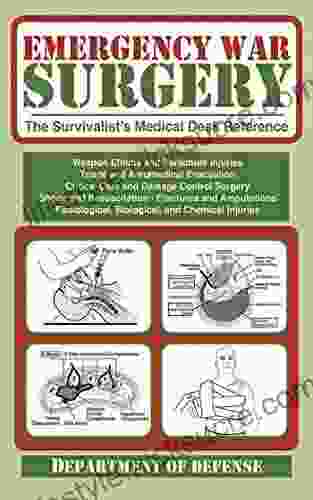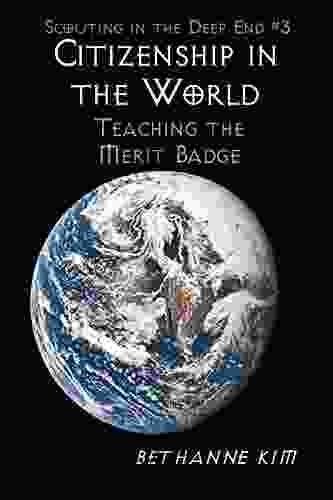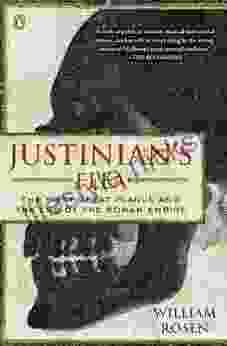The First Great Plague And The End Of The Roman Empire: A Historical Examination

The First Great Plague, also known as the Plague of Justinian, was a devastating pandemic that ravaged the Roman Empire in the 6th century. The plague is estimated to have killed between 25-100 million people, or approximately one-third of the world's population at the time. The plague had a profound impact on the Roman Empire, contributing to its decline and eventual fall. In this article, we will examine the origins, impact, and aftermath of the First Great Plague.
4.3 out of 5
| Language | : | English |
| File size | : | 2053 KB |
| Text-to-Speech | : | Enabled |
| Screen Reader | : | Supported |
| Enhanced typesetting | : | Enabled |
| Word Wise | : | Enabled |
| Print length | : | 384 pages |
Origins of the Plague
The origins of the First Great Plague are uncertain, but it is believed to have originated in Central Asia. The plague was likely spread by rats and fleas, and it reached the Roman Empire through trade routes. The first recorded outbreak of the plague occurred in the Egyptian port city of Pelusium in 541 AD. From there, the plague spread rapidly throughout the empire, reaching Constantinople, the capital of the empire, in 542 AD.
Impact of the Plague
The First Great Plague had a devastating impact on the Roman Empire. The plague killed millions of people, disrupted trade and commerce, and caused widespread social and economic chaos. The plague also weakened the Roman military, making it more vulnerable to attack from its enemies. In addition, the plague caused a decline in the population of the empire, which led to a shortage of workers and a decline in agricultural production.
The plague also had a significant psychological impact on the Roman people. The plague was seen as a sign of God's wrath, and it led to widespread fear and superstition. The plague also caused a decline in morale, and it contributed to the overall decline of the Roman Empire.
Aftermath of the Plague
The First Great Plague had a profound impact on the Roman Empire. The plague contributed to the decline of the empire, and it helped to set the stage for the eventual fall of the empire in the 5th century AD. The plague also had a lasting impact on the world. The plague helped to spread the bubonic plague, which remained a major threat to human health for centuries to come.
Key Events and Figures
The First Great Plague was associated with several key events and figures. These include:
- The Outbreak of the Plague in Pelusium (541 AD): The first recorded outbreak of the plague occurred in the Egyptian port city of Pelusium in 541 AD. From there, the plague spread rapidly throughout the empire, reaching Constantinople, the capital of the empire, in 542 AD.
- The Death of Emperor Justinian (565 AD): Emperor Justinian was the ruler of the Roman Empire during the First Great Plague. Justinian died of the plague in 565 AD, and his death marked the end of the Justinian era.
- The Rise of the Byzantine Empire: The First Great Plague contributed to the decline of the Roman Empire, and it helped to set the stage for the rise of the Byzantine Empire. The Byzantine Empire was a continuation of the Roman Empire, but it was centered in the eastern Mediterranean Sea.
Medical and Social Consequences
The First Great Plague had a significant impact on medicine and society. The plague led to the development of new medical treatments, and it also contributed to the decline of traditional Roman medicine. The plague also had a profound impact on social life. The plague caused widespread fear and superstition, and it led to the decline of social institutions. The plague also contributed to the decline of the Roman Empire, and it helped to set the stage for the rise of the Byzantine Empire.
The First Great Plague was a devastating pandemic that had a profound impact on the Roman Empire. The plague killed millions of people, disrupted trade and commerce, and caused widespread social and economic chaos. The plague also weakened the Roman military, making it more vulnerable to attack from its enemies. In addition, the plague caused a decline in the population of the empire, which led to a shortage of workers and a decline in agricultural production. The plague also had a significant psychological impact on the Roman people, and it contributed to the overall decline of the Roman Empire.
The First Great Plague is a reminder of the devastating impact that pandemics can have on human societies. The plague also highlights the importance of public health measures, and it shows how pandemics can contribute to social and political change.
4.3 out of 5
| Language | : | English |
| File size | : | 2053 KB |
| Text-to-Speech | : | Enabled |
| Screen Reader | : | Supported |
| Enhanced typesetting | : | Enabled |
| Word Wise | : | Enabled |
| Print length | : | 384 pages |
Do you want to contribute by writing guest posts on this blog?
Please contact us and send us a resume of previous articles that you have written.
 Fiction
Fiction Non Fiction
Non Fiction Romance
Romance Mystery
Mystery Thriller
Thriller SciFi
SciFi Fantasy
Fantasy Horror
Horror Biography
Biography Selfhelp
Selfhelp Business
Business History
History Classics
Classics Poetry
Poetry Childrens
Childrens Young Adult
Young Adult Educational
Educational Cooking
Cooking Travel
Travel Lifestyle
Lifestyle Spirituality
Spirituality Health
Health Fitness
Fitness Technology
Technology Science
Science Arts
Arts Crafts
Crafts DIY
DIY Gardening
Gardening Petcare
Petcare Angela Moore
Angela Moore Kasie West
Kasie West Leslie Sansone
Leslie Sansone Eugene C Toy
Eugene C Toy Cordelia K Castel
Cordelia K Castel Tanya Turner
Tanya Turner Nicholas A Christakis
Nicholas A Christakis Louise Bates Ames
Louise Bates Ames Michael Parker Pearson
Michael Parker Pearson Elizabeth Lim
Elizabeth Lim Erin Chack
Erin Chack Sean Go
Sean Go Joel Cotton
Joel Cotton Katherine Kurtz
Katherine Kurtz Amelia Freer
Amelia Freer C L Simchick
C L Simchick John Mcpherson
John Mcpherson Catherine Dees
Catherine Dees Joellen Patterson
Joellen Patterson Reinhold Messner
Reinhold Messner Janet Engle
Janet Engle Jennifer Margulis
Jennifer Margulis William Bohan
William Bohan Julie Caplin
Julie Caplin Andy Hunt
Andy Hunt Tim Hornbaker
Tim Hornbaker Claudia J Carr
Claudia J Carr Ashley Scott
Ashley Scott John A Buehrens
John A Buehrens Sarah Morgan Haydock
Sarah Morgan Haydock Iain Pardoe
Iain Pardoe John Jacobs
John Jacobs William Rosen
William Rosen Traci Gormley
Traci Gormley Sian Warriner
Sian Warriner Christina Kamp
Christina Kamp Frederick Lenz
Frederick Lenz Michael R Poll
Michael R Poll Pamela Lynn
Pamela Lynn Charles J Alsheimer
Charles J Alsheimer Nick Kolenda
Nick Kolenda Jd Mader
Jd Mader Deborah Lipsky
Deborah Lipsky Trent Shelton
Trent Shelton Kate Tietje
Kate Tietje Stephen Walker
Stephen Walker Jake Maddox
Jake Maddox Josh Taylor
Josh Taylor Don Bowers
Don Bowers Jennifer S Kelly
Jennifer S Kelly Amrita Pande
Amrita Pande Tahlia Kirk
Tahlia Kirk Jon Bonnell
Jon Bonnell Sheena Johnstone
Sheena Johnstone Rick Stanton
Rick Stanton Md Rezowan Ahmed
Md Rezowan Ahmed Robert W D Ball
Robert W D Ball Amie Lands
Amie Lands Eric T Knight
Eric T Knight Jenny Landreth
Jenny Landreth Jim Santos
Jim Santos Matthew Lombardi
Matthew Lombardi Elise Christie
Elise Christie George Bernard Shaw
George Bernard Shaw Ned Vizzini
Ned Vizzini Jan Marie Mueller
Jan Marie Mueller Randall E Schumacker
Randall E Schumacker Andrey Ryanskiy
Andrey Ryanskiy Sandra T Barnes
Sandra T Barnes Lady Antiva
Lady Antiva Shere Hite
Shere Hite Joseph Conrad
Joseph Conrad Ananda Lowe
Ananda Lowe Sarah Sumbal
Sarah Sumbal Ken Chaddock
Ken Chaddock K F Breene
K F Breene Christopher Cousteau
Christopher Cousteau Paul Dickson
Paul Dickson Shannon O Bourne
Shannon O Bourne Swede Burns
Swede Burns Dima Zales
Dima Zales Steve Greenberg
Steve Greenberg Maria Youtman
Maria Youtman Jack Falla
Jack Falla Brittany Clair
Brittany Clair Bill Carter
Bill Carter Timothy Malcolm
Timothy Malcolm Jessica Hatcher Moore
Jessica Hatcher Moore William Glasser M D
William Glasser M D Shalabh Aggarwal
Shalabh Aggarwal Stephen Barr
Stephen Barr Amelia Parker
Amelia Parker William G Dever
William G Dever Elizabeth S Gilbert
Elizabeth S Gilbert Victoria Wood
Victoria Wood Test Masters
Test Masters The 60 Minutes Summary
The 60 Minutes Summary Art Star
Art Star Ruth Nestvold
Ruth Nestvold Thomas J Whalen
Thomas J Whalen Marshall Goldsmith
Marshall Goldsmith Gina Chen
Gina Chen Oscar Baechler
Oscar Baechler Vivian Vande Velde
Vivian Vande Velde Candida Lawrence
Candida Lawrence Joe Nickell
Joe Nickell Kate Parham Kordsmeier
Kate Parham Kordsmeier Paul Oliver
Paul Oliver Redmond O Hanlon
Redmond O Hanlon Jack Nisbet
Jack Nisbet David Guymer
David Guymer Cheri Rae
Cheri Rae American Math Academy
American Math Academy Meikang Qiu
Meikang Qiu Dana Obleman
Dana Obleman Kristine Kathryn Rusch
Kristine Kathryn Rusch Marco Ferrero
Marco Ferrero Peter Larson
Peter Larson Kieron Gillen
Kieron Gillen Sandra Luna Mccune
Sandra Luna Mccune Rob Antoun
Rob Antoun Spike Dykes
Spike Dykes Brian Kateman
Brian Kateman Sheri Van Dijk
Sheri Van Dijk Victor J Stenger
Victor J Stenger Amy Bleuel
Amy Bleuel David Ranney
David Ranney Lisa Maloney
Lisa Maloney Philippa Langley
Philippa Langley Clancy Cavnar
Clancy Cavnar Benjamin Jelen
Benjamin Jelen Tijan
Tijan David Elkington
David Elkington Brendan Leonard
Brendan Leonard Shaun Gallagher
Shaun Gallagher Django Paris
Django Paris Camille Glenn
Camille Glenn Henry A Zumbrun 2
Henry A Zumbrun 2 Rich Rousseau
Rich Rousseau Edward J Denecke
Edward J Denecke Pav Bryan
Pav Bryan John Bingham
John Bingham Dr Bob Rotella
Dr Bob Rotella Peter Hayes
Peter Hayes Tom Patri
Tom Patri Marisa Anne Bass
Marisa Anne Bass James P Kelly
James P Kelly Douglas Wilson
Douglas Wilson Sarah Woodbury
Sarah Woodbury Deborah Vinall Psyd Lmft
Deborah Vinall Psyd Lmft Paul Graham
Paul Graham John L Field
John L Field Amara Charles
Amara Charles Wolf Moon
Wolf Moon Amelia Edith Huddleston Barr
Amelia Edith Huddleston Barr Amber Zygutis
Amber Zygutis Michael Winkelman
Michael Winkelman American Baseball Coaches Association
American Baseball Coaches Association Chloe Gong
Chloe Gong Erik Qualman
Erik Qualman Peter Worley
Peter Worley Richard Cohen
Richard Cohen Patrick O Sullivan
Patrick O Sullivan Donna Williams
Donna Williams Charles Hall
Charles Hall Andy Couturier
Andy Couturier Robyn Davidson
Robyn Davidson Mariano Anaya
Mariano Anaya Tabitha Suzuma
Tabitha Suzuma Suzanne Stabile
Suzanne Stabile Mark Turley
Mark Turley Tom Colicchio
Tom Colicchio Susanna Heli
Susanna Heli Umer W
Umer W Jessica Cunsolo
Jessica Cunsolo Kevin Stiegelmaier
Kevin Stiegelmaier Jack Tupp
Jack Tupp Temple Grandin
Temple Grandin Michael Abayomi
Michael Abayomi Rosanna Davison
Rosanna Davison Helen E Fisher
Helen E Fisher Tom Deck
Tom Deck Anthony Horowitz
Anthony Horowitz Theresa I Soto
Theresa I Soto Michelle Newhart
Michelle Newhart William Stillman
William Stillman Tavi Gevinson
Tavi Gevinson Erica T Lehrer
Erica T Lehrer Amira Mikhail
Amira Mikhail Joseph Howse
Joseph Howse Lizabeth Hardman
Lizabeth Hardman Ned Seaton
Ned Seaton Michaela Riva Gaaserud
Michaela Riva Gaaserud Desi Northup
Desi Northup Warren B Powell
Warren B Powell Jack Freeman
Jack Freeman Amy Adele Hasinoff
Amy Adele Hasinoff Jeffrey Steadman
Jeffrey Steadman Alan I Marcus
Alan I Marcus John Maxwell Wood
John Maxwell Wood Kumo Kagyu
Kumo Kagyu J Marin Younker
J Marin Younker John Lukacs
John Lukacs David Grinspoon
David Grinspoon Jason Thompson
Jason Thompson Mac Fortner
Mac Fortner Josiah Hesse
Josiah Hesse Gail Maccoll
Gail Maccoll Dave Hanson
Dave Hanson Christopher E Larsen
Christopher E Larsen Tim Marshall
Tim Marshall Nikhil Bhardwaj
Nikhil Bhardwaj Steven Charleston
Steven Charleston Frank Nappi
Frank Nappi Glenn Stout
Glenn Stout Summer Michaud Skog
Summer Michaud Skog Sarah J Maas
Sarah J Maas Richard Wagamese
Richard Wagamese Lars Andersen
Lars Andersen Chris Irons
Chris Irons Naomi Oreskes
Naomi Oreskes Amy Bizzarri
Amy Bizzarri Thom Hartmann
Thom Hartmann Christine Fanthome
Christine Fanthome Joe E Harvey
Joe E Harvey Karen Deerwester
Karen Deerwester Joseph Mcmoneagle
Joseph Mcmoneagle Heidi J Larson
Heidi J Larson Cynthia Gabriel
Cynthia Gabriel Amber Smith
Amber Smith Jeff Martone
Jeff Martone Denise Ni
Denise Ni A Sorority Of Mothers
A Sorority Of Mothers Holly Herrick
Holly Herrick Mark Taylor
Mark Taylor Sandra Bardwell
Sandra Bardwell James Mullaney
James Mullaney Alan Margot
Alan Margot Dr Scott A Johnson
Dr Scott A Johnson Silvia Botros
Silvia Botros Jan E Stets
Jan E Stets Matthew L Martin
Matthew L Martin Gerald Corey
Gerald Corey Jean Rose
Jean Rose Rosalind Wiseman
Rosalind Wiseman Tyler Simmons
Tyler Simmons Sterling Test Prep
Sterling Test Prep Md Mahady Hasan
Md Mahady Hasan Craig Larman
Craig Larman Howard J Meditz
Howard J Meditz Jean Van T Hul
Jean Van T Hul Candy Verney
Candy Verney Malba Tahan
Malba Tahan Rick Deutsch
Rick Deutsch Jonathan Law
Jonathan Law Dmv Test Bank
Dmv Test Bank Dolores Kong
Dolores Kong Joseph Wayne Smith
Joseph Wayne Smith Paul Kaplowitz
Paul Kaplowitz Jonathan Bartlett
Jonathan Bartlett Michael Reichert
Michael Reichert Gary Wiener
Gary Wiener David Yoon
David Yoon Amir Alexander
Amir Alexander Diane Greer
Diane Greer Donovan Hohn
Donovan Hohn Joan Freeman
Joan Freeman Robert A Weinberg
Robert A Weinberg Jerry D Moore
Jerry D Moore Roman Gelperin
Roman Gelperin Muhammad Vandestra
Muhammad Vandestra Rose Mannering
Rose Mannering Amber Lia
Amber Lia Laekan Zea Kemp
Laekan Zea Kemp Derek Thompson
Derek Thompson Theresa Y Wee M D
Theresa Y Wee M D Paul Kockelman
Paul Kockelman Amie Kaufman
Amie Kaufman Kresley Cole
Kresley Cole K M Shea
K M Shea Larry K Brendtro
Larry K Brendtro Alex Polyakov
Alex Polyakov Joe Dan Lowry
Joe Dan Lowry Dom Amore
Dom Amore Jeanne Ryan
Jeanne Ryan Sarah Dessen
Sarah Dessen Cathy Williams
Cathy Williams Carlo Buzzichelli
Carlo Buzzichelli Byron Nelson
Byron Nelson Don Mann
Don Mann Marit Weisenberg
Marit Weisenberg Hadley Wickham
Hadley Wickham Don Stradley
Don Stradley Jacob Bronowski
Jacob Bronowski Ellie Wood
Ellie Wood Jayson Gaddis
Jayson Gaddis Amby Cooper
Amby Cooper Antonio R Damasio
Antonio R Damasio Mark Worden
Mark Worden Jack Weatherford
Jack Weatherford Arlene Blum
Arlene Blum James E Packer
James E Packer Dan Abnett
Dan Abnett Tom Taulli
Tom Taulli David Salsburg
David Salsburg Valerie Bass
Valerie Bass Rodney M Howard Browne
Rodney M Howard Browne Toni Tone
Toni Tone Pinky Mckay
Pinky Mckay Isabella Krystynek
Isabella Krystynek Amy Mccready
Amy Mccready E T Bryant
E T Bryant Josephine Atluri
Josephine Atluri Joseph P Weir
Joseph P Weir Courtney Defeo
Courtney Defeo Kyle Hunt
Kyle Hunt Sharon K Zumbrunn
Sharon K Zumbrunn Nathan Belofsky
Nathan Belofsky Nikala Smith
Nikala Smith Brian Pace
Brian Pace Ronda Rousey
Ronda Rousey Devin Olsen
Devin Olsen Kathleen Glasgow
Kathleen Glasgow Stephen M Barr
Stephen M Barr Rob Fisher
Rob Fisher Mark Stallard
Mark Stallard Kris Leonard
Kris Leonard Amy Baldwin
Amy Baldwin Vinod Kumar Khanna
Vinod Kumar Khanna Bridget Ericsson
Bridget Ericsson Sue Monk Kidd
Sue Monk Kidd Philip Gibson
Philip Gibson Pico Iyer
Pico Iyer Patricia L Papernow
Patricia L Papernow Dan Schlossberg
Dan Schlossberg Lisa Zimmer Hatch
Lisa Zimmer Hatch Vicki Hearne
Vicki Hearne Nisha Garg
Nisha Garg Ray Mancini
Ray Mancini Johan Norberg
Johan Norberg Chris Carlsson
Chris Carlsson Topher Donahue
Topher Donahue Marina Robb
Marina Robb Michael Cosgrove
Michael Cosgrove H Bedford Jones
H Bedford Jones Stanley J Farlow
Stanley J Farlow Amy Camp
Amy Camp Nicholeen Peck
Nicholeen Peck Robert Melillo
Robert Melillo Heather Macfadyen
Heather Macfadyen C W Lockhart
C W Lockhart Cole Hersowitz
Cole Hersowitz Ryan Gray
Ryan Gray Amy Brown
Amy Brown Kathleen M Stacy
Kathleen M Stacy Theodore Sider
Theodore Sider Michael Ondaatje
Michael Ondaatje Martin Pollizotto
Martin Pollizotto Randy Schultz
Randy Schultz June Cl Tan
June Cl Tan Jeremy J Baumberg
Jeremy J Baumberg Bethanne Kim
Bethanne Kim Amber O Neal Johnston
Amber O Neal Johnston Cody Monk
Cody Monk Zeshan Qureshi
Zeshan Qureshi Julie Mosier
Julie Mosier Cookie O Gorman
Cookie O Gorman Joe Dante
Joe Dante Chad Ford
Chad Ford John Ferrell
John Ferrell Laura Slinn
Laura Slinn Jonathon Miller Weisberger
Jonathon Miller Weisberger Autumn Jordon
Autumn Jordon Torey L Hayden
Torey L Hayden Susan White
Susan White Julie Schacht Sway
Julie Schacht Sway Victoria Richards
Victoria Richards Stephenie Meyer
Stephenie Meyer Gia Giasullo
Gia Giasullo Amy B Middleman
Amy B Middleman Sean Gibson
Sean Gibson Clotaire Rapaille
Clotaire Rapaille Doug Peterson
Doug Peterson Kezia Endsley
Kezia Endsley Wendy Margolis
Wendy Margolis Tamora Pierce
Tamora Pierce Kathy A Zahler
Kathy A Zahler Steven C Hayes
Steven C Hayes Jenni Hicks
Jenni Hicks Rachel Gurevich
Rachel Gurevich Anthony Haynes
Anthony Haynes Shanna Cunning
Shanna Cunning Stephen Goodwin
Stephen Goodwin Terry Wieland
Terry Wieland Emma Mae Jenkins
Emma Mae Jenkins Robb Walsh
Robb Walsh Erika Napoletano
Erika Napoletano Guillaume Haeringer
Guillaume Haeringer Alex Stone
Alex Stone Eugenia Viti
Eugenia Viti Eric Zweig
Eric Zweig Jocelyn Goodwin
Jocelyn Goodwin Kenneth P Stephens
Kenneth P Stephens Trevor Day
Trevor Day Helena P Blavasky
Helena P Blavasky Jameson M Wetmore
Jameson M Wetmore Jean Christie Ashmore
Jean Christie AshmoreK D
 Grant Dever
Grant Dever Amiee Mueller
Amiee Mueller Paul Wieland
Paul Wieland Ruth M Tappen
Ruth M Tappen Amber Foster
Amber Foster Deborah J Rumsey
Deborah J Rumsey Eric Tyndall
Eric Tyndall Amante P Marinas
Amante P Marinas Joseph Klaits
Joseph Klaits Chad Starkey
Chad Starkey Mark W T Harvey
Mark W T Harvey Eric E Bowne
Eric E Bowne Gal Dem
Gal Dem Catherine Ryan Gregory
Catherine Ryan Gregory Garrett M Fitzmaurice
Garrett M Fitzmaurice Anne Chambers
Anne Chambers Stanley I Greenspan
Stanley I Greenspan Dr Elizabeth Cherevaty Nd Rac
Dr Elizabeth Cherevaty Nd Rac Buck Tilton
Buck Tilton Stephen J Collier
Stephen J Collier Melody Schreiber
Melody Schreiber Julie Barlow
Julie Barlow Ana And Jack Hicks
Ana And Jack Hicks Jason Borte
Jason Borte Amber Lee Sellers
Amber Lee Sellers Ignatius Donnelly
Ignatius Donnelly Tracy Lorraine
Tracy Lorraine Don Orwell
Don Orwell American Psychological Association
American Psychological Association David Burch
David Burch Derrick Jensen
Derrick Jensen Wade Rouse
Wade Rouse Harley Reid
Harley Reid Kate Fox
Kate Fox Vince Kotchian
Vince Kotchian Sonia Hartl
Sonia Hartl Amy Perry
Amy Perry Brian Klaas
Brian Klaas Fred Pyrczak
Fred Pyrczak Danny Dreyer
Danny Dreyer J Stephen Jones
J Stephen Jones Andy Singleton
Andy Singleton Kathy Spratt
Kathy Spratt Charles Thompson
Charles Thompson J L Weil
J L Weil Adam Cort
Adam Cort Christopher Harlan
Christopher Harlan Norman Doidge
Norman Doidge Therese A Rando
Therese A Rando Paul Schwartz
Paul Schwartz Mike Adamick
Mike Adamick L Frank Baum
L Frank Baum Krystal Sutherland
Krystal Sutherland Martin Williams
Martin Williams Mitt Romney
Mitt Romney James W Williams
James W Williams Anna B Doe
Anna B Doe Alexandrea Weis
Alexandrea Weis Ruta Nonacs
Ruta Nonacs Nina Freudenberger
Nina Freudenberger Liz Fosslien
Liz Fosslien Laini Taylor
Laini Taylor Amit Saha
Amit Saha Amy Blakeslee
Amy Blakeslee Saleh Alkhalifa
Saleh Alkhalifa Laurie A Watkins
Laurie A Watkins Jack Ewing
Jack Ewing Jeff Gaudette
Jeff Gaudette P Aarne Vesilind
P Aarne Vesilind Bruce Dowbiggin
Bruce Dowbiggin Neville Goddard
Neville Goddard
Light bulbAdvertise smarter! Our strategic ad space ensures maximum exposure. Reserve your spot today!

 Aubrey BlairSwimming Science Behind Sports: Lizabeth Hardman Unlocks the Secrets of Elite...
Aubrey BlairSwimming Science Behind Sports: Lizabeth Hardman Unlocks the Secrets of Elite...
 Kenneth ParkerQuality Compression Performance and Power Trade-Off Analysis: A Comprehensive...
Kenneth ParkerQuality Compression Performance and Power Trade-Off Analysis: A Comprehensive...
 Gene PowellFoul Lady Fortune: A Gripping Historical Fantasy that Transports Readers to...
Gene PowellFoul Lady Fortune: A Gripping Historical Fantasy that Transports Readers to... Fyodor DostoevskyFollow ·18.1k
Fyodor DostoevskyFollow ·18.1k Vladimir NabokovFollow ·6.9k
Vladimir NabokovFollow ·6.9k Ricky BellFollow ·18.8k
Ricky BellFollow ·18.8k Clark BellFollow ·11.9k
Clark BellFollow ·11.9k Anton FosterFollow ·2.2k
Anton FosterFollow ·2.2k Brian WestFollow ·7.3k
Brian WestFollow ·7.3k Gus HayesFollow ·12.4k
Gus HayesFollow ·12.4k Corey HayesFollow ·18.7k
Corey HayesFollow ·18.7k

 Ira Cox
Ira CoxUnveiling the Hidden Gem: Moon, Virginia - A Washington...
Nestled within the picturesque...

 Jorge Luis Borges
Jorge Luis BorgesThe Ultimate Survivalist's Medical Guide: A Comprehensive...
In the realm of...

 Henry Green
Henry GreenDavid Douglas: Exploring the Natural History of the...
David Douglas was a...

 Eric Hayes
Eric HayesUnderstanding Citizenship in a Globalized World: A...
Citizenship is a complex and multifaceted...

 Will Ward
Will WardUnveiling Research Real Talk: Navigating the Labyrinth of...
Research, the...
4.3 out of 5
| Language | : | English |
| File size | : | 2053 KB |
| Text-to-Speech | : | Enabled |
| Screen Reader | : | Supported |
| Enhanced typesetting | : | Enabled |
| Word Wise | : | Enabled |
| Print length | : | 384 pages |








